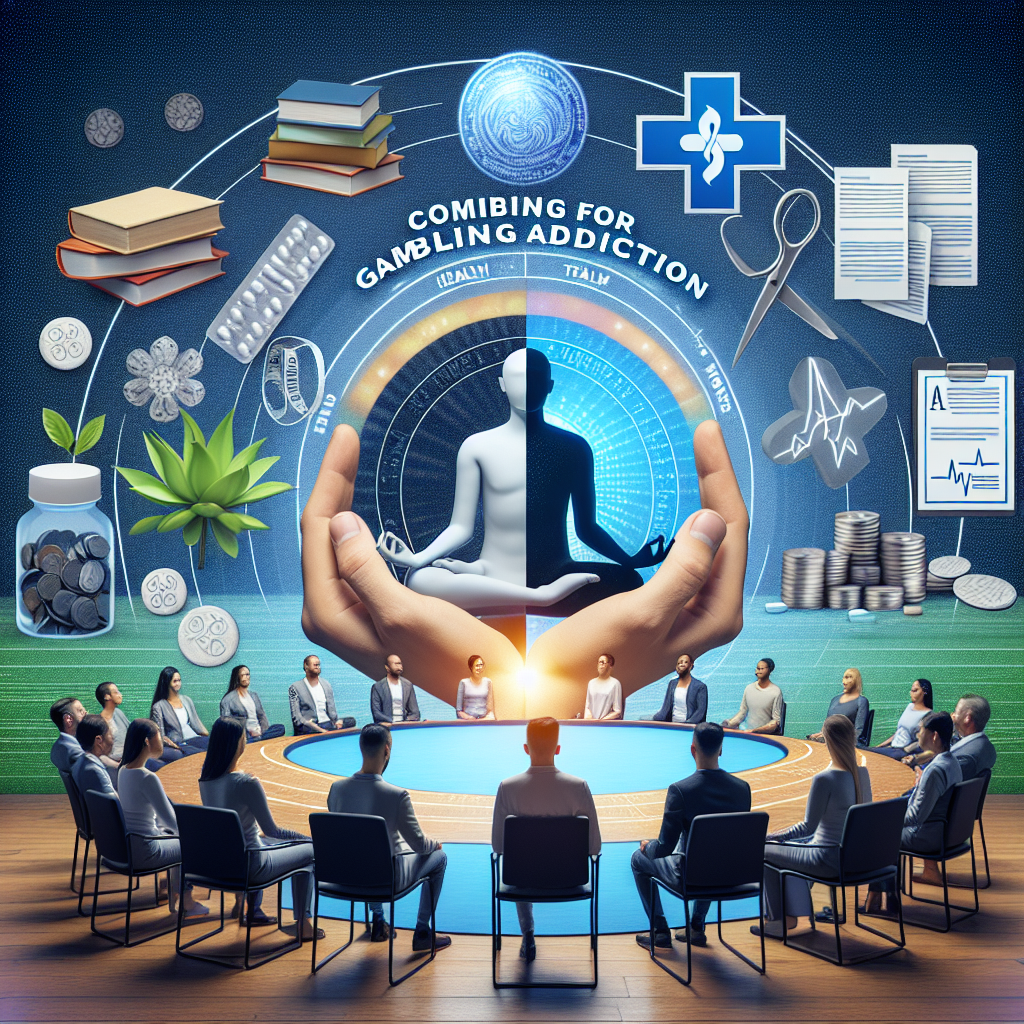-
Table of Contents

“Integrative Healing: Combining Gambling Addiction Recovery with Comprehensive Addiction Treatments.”
Introduction
Combining gambling addiction recovery with other addiction treatments is a multifaceted approach that addresses the complex interplay between different types of addictive behaviors. This integrated treatment strategy recognizes that individuals struggling with gambling addiction often face co-occurring issues such as substance abuse, mental health disorders, and other behavioral addictions. By employing a comprehensive treatment plan that includes cognitive-behavioral therapy, medication management, support groups, and holistic therapies, healthcare providers can offer a more effective and personalized recovery process. This approach not only targets the specific triggers and patterns associated with gambling addiction but also addresses the underlying psychological and emotional factors contributing to multiple addictions, thereby enhancing the overall chances of long-term recovery and well-being.
Integrating Gambling Addiction Recovery with Substance Abuse Treatment: A Comprehensive Approach
Combining gambling addiction recovery with other addiction treatments can be a powerful and comprehensive approach to achieving long-term sobriety and well-being. Many individuals struggling with gambling addiction often face co-occurring substance abuse disorders, making it essential to address both issues simultaneously. By integrating gambling addiction recovery with substance abuse treatment, individuals can benefit from a holistic approach that addresses the root causes of their addictive behaviors and provides them with the tools they need to build a healthier future.
One of the key advantages of integrating these treatments is the ability to address the underlying psychological and emotional issues that contribute to both gambling and substance abuse. Often, individuals turn to gambling and substances as a way to cope with stress, anxiety, depression, or trauma. By participating in a comprehensive treatment program, individuals can work with therapists and counselors to explore these underlying issues and develop healthier coping mechanisms. This dual approach not only helps to reduce the risk of relapse but also promotes overall mental and emotional well-being.
Moreover, combining gambling addiction recovery with substance abuse treatment allows for a more personalized and tailored approach to recovery. Each individual’s journey to sobriety is unique, and a one-size-fits-all approach is rarely effective. By integrating treatments, healthcare providers can create customized plans that address the specific needs and challenges of each individual. This may include a combination of individual therapy, group therapy, medication management, and support groups. The goal is to provide a comprehensive support system that empowers individuals to take control of their lives and make positive changes.
Another significant benefit of this integrated approach is the opportunity for individuals to build a strong support network. Recovery can be a challenging and isolating process, but having a community of individuals who understand and share similar experiences can make a world of difference. Support groups and group therapy sessions provide a safe space for individuals to share their struggles, celebrate their successes, and offer encouragement to one another. This sense of camaraderie and mutual support can be incredibly motivating and inspiring, helping individuals stay committed to their recovery journey.
Furthermore, integrating gambling addiction recovery with substance abuse treatment can lead to better long-term outcomes. Research has shown that individuals who receive comprehensive treatment for co-occurring disorders are more likely to achieve and maintain sobriety compared to those who only receive treatment for one disorder. By addressing both gambling and substance abuse simultaneously, individuals can develop a deeper understanding of their addictive behaviors and learn strategies to prevent relapse. This holistic approach not only promotes lasting recovery but also enhances overall quality of life.
In addition to the psychological and emotional benefits, integrating these treatments can also have positive effects on physical health. Substance abuse and gambling addiction can take a significant toll on the body, leading to a range of health issues such as cardiovascular problems, liver disease, and weakened immune systems. By participating in a comprehensive treatment program, individuals can receive medical care and support to address these health concerns. This may include regular check-ups, nutritional counseling, and exercise programs designed to promote physical well-being.
In conclusion, combining gambling addiction recovery with substance abuse treatment offers a comprehensive and effective approach to achieving long-term sobriety and well-being. By addressing the underlying psychological, emotional, and physical issues that contribute to addictive behaviors, individuals can develop the tools and support they need to build a healthier future. This integrated approach not only reduces the risk of relapse but also promotes overall mental, emotional, and physical well-being, inspiring individuals to take control of their lives and make positive changes.
Holistic Strategies for Concurrent Gambling and Behavioral Addiction Recovery
Combining gambling addiction recovery with other addiction treatments can be a complex yet profoundly rewarding journey. The holistic approach to treating concurrent addictions recognizes that individuals often face multiple challenges simultaneously, and addressing these issues in tandem can lead to more comprehensive and lasting recovery. This method integrates various therapeutic strategies, focusing on the mind, body, and spirit, to create a balanced and supportive recovery environment.
One of the key elements in this holistic strategy is the recognition that addiction, whether to gambling or substances, often stems from underlying psychological issues. These can include trauma, anxiety, depression, or other mental health disorders. By addressing these root causes through therapies such as cognitive-behavioral therapy (CBT), dialectical behavior therapy (DBT), or eye movement desensitization and reprocessing (EMDR), individuals can begin to understand and manage the triggers that lead to addictive behaviors. This psychological support is crucial in helping individuals develop healthier coping mechanisms and build resilience against relapse.
In addition to psychological therapies, incorporating physical health into the recovery process is essential. Regular exercise, proper nutrition, and adequate sleep can significantly impact an individual’s overall well-being and ability to maintain sobriety. Exercise, in particular, has been shown to reduce stress, improve mood, and increase energy levels, all of which are beneficial in combating addiction. Nutritional counseling can help individuals understand the importance of a balanced diet in maintaining mental and physical health, while sleep hygiene practices can ensure that they are well-rested and better equipped to handle the challenges of recovery.
Spirituality and mindfulness practices also play a vital role in holistic addiction recovery. Many individuals find solace and strength in connecting with a higher power or engaging in mindfulness activities such as meditation, yoga, or tai chi. These practices can help individuals cultivate a sense of inner peace, reduce stress, and enhance self-awareness. By fostering a deeper connection with themselves and their surroundings, individuals can develop a more profound sense of purpose and motivation to stay on the path to recovery.
Support networks are another critical component of holistic addiction recovery. Engaging with support groups, whether they are 12-step programs like Gamblers Anonymous or other peer support groups, can provide individuals with a sense of community and shared experience. These groups offer a safe space for individuals to share their struggles, celebrate their successes, and receive encouragement from others who understand their journey. Additionally, involving family and friends in the recovery process can help rebuild trust and strengthen relationships that may have been strained by addiction.
Integrating complementary therapies such as art therapy, music therapy, or equine therapy can also enhance the recovery experience. These creative outlets allow individuals to express their emotions in non-verbal ways, explore their identities, and discover new passions and interests. Engaging in these activities can provide a sense of accomplishment and joy, which can be incredibly motivating during the recovery process.
Ultimately, combining gambling addiction recovery with other addiction treatments through a holistic approach can lead to a more comprehensive and sustainable recovery. By addressing the psychological, physical, spiritual, and social aspects of addiction, individuals can develop a well-rounded and robust foundation for a healthier, addiction-free life. This integrative strategy not only helps individuals overcome their addictions but also empowers them to thrive and find fulfillment in their lives beyond recovery.
Q&A
1. **Question:** Can gambling addiction recovery be integrated with substance abuse treatment programs?
**Answer:** Yes, gambling addiction recovery can be integrated with substance abuse treatment programs, as many facilities offer comprehensive treatment plans that address multiple addictions simultaneously.
2. **Question:** Are there specialized therapies that address both gambling addiction and other forms of addiction?
**Answer:** Yes, therapies such as Cognitive Behavioral Therapy (CBT) and group therapy are often used to treat both gambling addiction and other forms of addiction, providing a holistic approach to recovery.
Conclusion
Combining gambling addiction recovery with other addiction treatments can be effective, as many underlying psychological and behavioral issues are common across different types of addictions. Integrated treatment approaches that address multiple addictions simultaneously can provide comprehensive support, improve coping strategies, and reduce the risk of relapse. This holistic approach often includes therapy, support groups, and sometimes medication, tailored to address the specific needs of individuals with co-occurring addictions.



